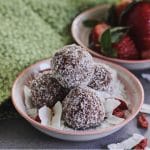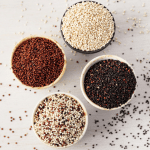I'm hearing from so many that they are snacking more than usual as they spend more time at home. I totally understand. There's been so much change, uncertainty and fear in our lives over the last few months and food can provide comfort. However, the good news is snacking is not just an emotional response. It's also a biochemical response that is easy to address.
As working from home becomes the new normal for many, now is the time to set some healthy eating habits. Not only will this help with weight management but you'll also enjoy more energy and focus during your day.
Below are my tips to avoid those constant trips to the cookie jar.
1. Clean out your pantry.
- The first step is to give your pantry a clean out. Whatever is your biggest weakness throw it out! Chips in the bin! Chocolate biscuits in the bin!
- The food industry create products with a 'bliss point' in mind. This is a combination of fat, sugar and salt that makes a product irresistible. Once you start eating these products it is very hard to stop. Removing the temptations is the best way. If it’s not in the cupboard you can’t eat it. Simple.
TIP Clear your pantry of temptations. It will take you 5 minutes. Just do it :)
2. Don't skip breakfast, this is really important.
- Breakfast will stabilise your blood sugar levels and keep you energised through the morning. Skipping meals leads to a drop in blood sugar levels causing your body to crave carbohydrates as a quick source of energy.
- You'll also find you're more focused and concentrate better when you've enjoyed a balanced breakfast.
- Breakfast also sets you up for making healthy choices throughout the day. You're more likely to choose a healthy lunch and then this flows on to dinner as well.
- But not all breakfasts are equal. Tea and toast, cereal with skim milk are high carbohydrate foods. Make sure your breakfast includes protein. Quality sources of protein you can add to your breakfast include eggs, lentils, Greek yoghurt, oats, quinoa, almonds and chia seeds.
TIP Broaden your definition of breakfast. It can be leftovers from dinner, an omelette topped with avocado and rocket, or vegetable fritters.

You might like to try Zucchini & Haloumi Fritters for breakfast. You can enjoy with a herbed yoghurt or top with smoked salmon for added protein. You can download the recipe card here.
3. Make sure every meal/snack contains a combination of protein, carbohydrate and healthy fat.
- When carbohydrates are eaten with protein and healthy fats, they are digested slowly and glucose enters the blood stream at a moderate rate over a period of several hours.
- This combination reduces hunger between meals and keeps you energised.
- If you'd like more information on how to combine protein, carbohydrate and healthy fat then download my Healthy Plate
TIP Ensure protein, carbohydrate and healthy fat in every meal to avoid over eating, you'll be fuller for longer and avoid sugar cravings.
4. Be prepared with healthy snacks.
- Be prepared for when you do have a sweet craving by having something nourishing on hand.
- Generally I don't recommend snacking, I prefer to give your digestive system a break through the day. However there are times when an afternoon snack can be helpful. You might have had an early morning gym session, a poor night's sleep or just had a draining day and you’re looking for a pick me up. This is when a snack is perfectly fine and will stop you overeating at dinner time.
- I have a series of Healthy Snack Cooking Videos that you might find useful. You can find them here.
TIP Remember a snack should also have a combination of protein, carbohydrate and healthy fat. My favourite is a handful of blueberries, 6-8 almonds + 2 pieces of 70% dark chocolate.
5. Are you getting a good night's sleep?
- Not enough sleep, ie less than 7-8 hours, impacts hormones that control appetite. Leptin is the hormone that signals a feeling of fullness. Whereas ghrelin is the hormone that triggers hunger.
- Studies have shown that a poor nights sleep, ie 4-5 hours, increases ghrelin and decreases leptin. The end result is you are more hungry and take longer to reach a feeling of fullness. Which equals increased calorie intake.
- It's also been identified that a lack of sleep depresses the impulse control area of our brain, which is responsible for putting the breaks on over eating. If you're interested in reading more on the health benefits of sleep I highly recommend Dr Matthew Walker's "Why we Sleep".
TIP Prioritise your sleep, it's as important as diet and exercise for maintaining a healthy weight. Why not set an alarm to go to bed.
If you'd like to get your diet back on track I recommend a Diet Assessment. This is a simple way to kickstart dietary changes. I send you a food diary to complete. You'll then receive a report detailing my recommendations. Includes a 15 minute phone call to answer any questions you may have. Cost is $47.00. Please register your interest here. Or if you have any questions please don't hesitate to call.
Warm regards
Wendy
Wendy Middleton
Nutritionist & Caterer
Adv Dip Nut Med, ATMS 50532
0403 861 117
[email protected]
www.acutabovenutrition.com.au




